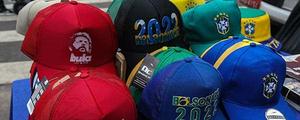WASHINGTON, D.C. -- As Americans prepare to vote, Gallup Polls conducted in 2007 and 2008 reveal that a median of 41% of citizens across 134 countries worldwide have confidence that elections in their own countries are honest, while a median of 47% do not.
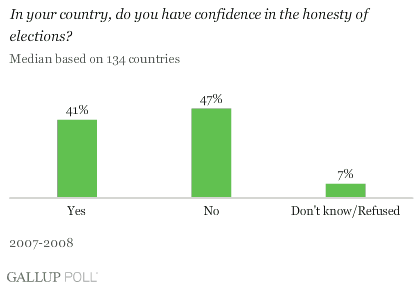
Broad Spectrum of "Perceived Honesty"
The proportions of residents who say they have confidence in the honesty of election in their country range from a high of 93% in Rwanda to a low of 10% in Zimbabwe. In light of Zimbabwe's current political crisis and the long history of quelling any opposition to the ruling ZANU-PF party dominance, it is not surprising that Zimbabwe rates last among countries surveyed in terms of honesty -- or lack thereof -- of elections. At the top of the list, Rwanda may appear as a surprise against its not-so-distant background of genocide. But such widespread positive perceptions of the honesty of elections, which are on par with, or more prevalent than, those expressed by residents in Denmark, Finland, and other Northern European countries, may suggest hope for a better future among Rwandans.
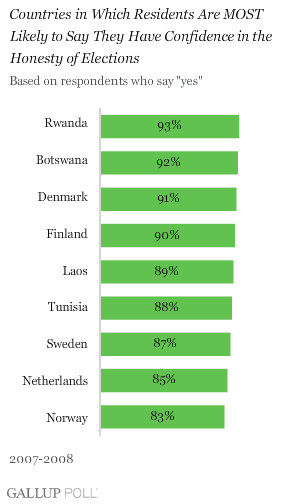
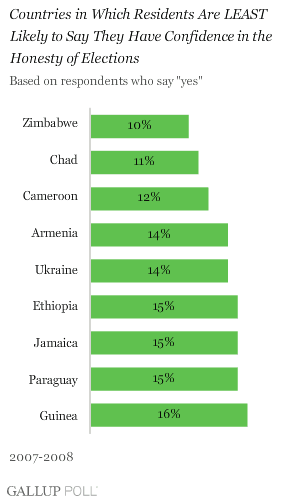
In this survey, 47% of Americans reported that they had confidence in the honesty of their elections. This is somewhat higher than the worldwide median, but lower compared with many other nations, Western democracies, and otherwise.
In broad, global regions, perceptions of the honesty of elections are most favorable in Europe and Asia, where the median stands at 48% in each region. Within Europe, confidence is much higher in Western countries than in Eastern countries. (Italy is an exception in Western Europe, with only a plurality [46%] expressing confidence in the honesty of elections.) Perceptions of honesty are roughly similar in Africa and the Americas, where medians of 36% and 33% of respondents, respectively, trust that their countries' elections are honest.
Honesty, Corruption, and Well-Being
In general, the less corrupt the country, as rated by Transparency International, the more prevalent the perception that elections are honest. Some notable exceptions are Rwanda, Botswana, and Laos. Transparency International places these countries in the middle of the corruption pack, but Gallup's findings indicate residents of each country are relatively likely to view their elections as honest.
Among the 97 countries where Gallup collected well-being results, those in which few respondents say they have confidence in the honesty of their national elections have lower average Well-Being Index scores. (Gallup's Well-Being Index measures respondents' perceptions of their current and future lives on the Cantril Self-Anchoring Striving Scale with steps numbered from 0 to 10, where "0" indicates the worst possible life and 10 the best possible life.) For example, in countries that rank in the lowest quartile in terms of perceived honesty in elections, the median percentage of respondents who score in the "thriving" range is just 18%. In contrast, countries that fall in the highest quartile in terms of perceived honesty in elections, the median percentage of respondents who score in the thriving range is 38%.
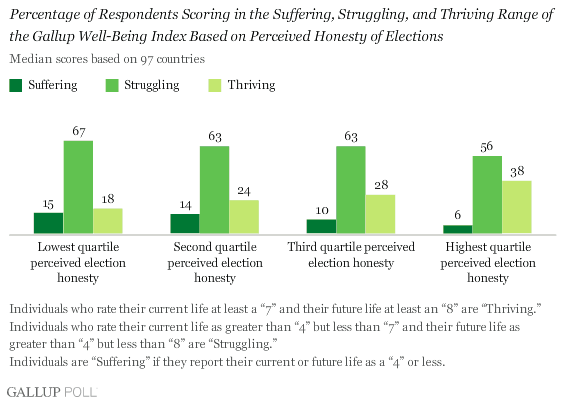
Other political indicators, such as confidence in the national government, are also significant predictors of well-being, but none as predictive as confidence in the honesty of elections. As much as any other political gauge, the honesty of elections question is a significant indicator of the emotional pulse of a country. The poll findings underscore the work, in terms of good governance, that many governments around the world have to do in order to improve public perceptions that national elections are honest.


Survey Methods
Results are based on telephone and face-to-face interviews conducted in 2007 and 2008 with approximately 1,000 adults in each of the 134 countries surveyed. Due to differences in sample size across countries, confidence intervals for the honesty of elections question range from ±2 to ±6 percentage points. In addition to sampling error, question wording and practical difficulties in conducting surveys can introduce error or bias into the findings of public opinion polls.
